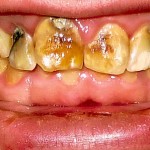There is no harm in drinking water, right?
Most of us would probably not think twice about the contents of our drinking water. The water that we get out of the tap actually contains added fluoride to help prevent tooth decay by protecting tooth enamel against acids. However, we can obtain fluoride naturally through eating various foods. Many of us may also use fluoride containing products, such as toothpastes, mouth gels, dental floss, and dietary supplements.
http://youtu.be/tSKToTFitd0
The Government of Canada first introduced water fluoridation in 1968. However, since then, the government has reduced the optimum level of fluoride four times. The most recent cutback was in 2008, where the optimum level was lowered to almost half the initial recommended amount in 1968.
Larger doses of fluoride may causes serious health issues, including dental fluorosis, weakened bones, or even bone cancer. Too much fluoride causes bone structure disturbances, decreases fertility, and accumulates in certain areas of the brain, which will affect behaviour and learning.
There is an ongoing debate about whether or not water fluoridation is the cause of the decline in tooth decay. However, many studies have shown that tooth decay have actually started to decline before the fluoridation of water. Furthermore, tooth decay in children who have used fluoridated water all their lives continues to decline, which means that there is probably another factor involved.
The safety level of fluoride in our drinking water remains questionable, and with so many health risks associated with excess levels of fluoride, as well as the exposure of so many fluoridated products, I believe that water fluoridation is both unnecessary and risky. Although fluoride does help prevent tooth decay, the possibility of excess fluoride intake outweighs the benefit.
References:
- The Changing Patterns of Systemic Fluoride Intake
- Picture: Severe Fluorosis
- Wikipedia
- Youtube

